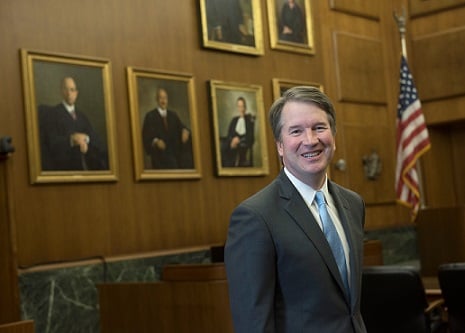The Senate confirmed Judge Brett M. Kavanaugh to the Supreme Court on Saturday afternoon, signaling the conclusion of what many have called the most contentious confirmation battle in recent memory — a battle that intensified last month after Stanford affiliate Dr. Christine Blasey Ford accused Kavanaugh of sexually assaulted her in the 1980s. Kavanaugh won the confirmation by a vote of 50-48, delivering a significant victory to President Trump and securing a conservative majority in the Court.
According to Ford, a Palo Alto University psychology professor who teaches in a consortium with Stanford and who goes by the name Christine Blasey professionally, the new Supreme Court justice groped her and tried to remove her clothes at a high school party in the 1980s. Kavanaugh has adamantly denied the allegations.
Saturday’s vote also comes in the wake of a New York Times op-ed signed by 2,400 law professors against Kavanaugh’s nomination. The letter, which 31 Stanford Law professors signed, argued that Kavanaugh did not display the impartiality and judicial temperament required of a Supreme Court justice.
“As someone who knew and liked Brett Kavanaugh when we clerked together, I have tried very hard to stay out of this process and to give him the benefit of the doubt,” said Stanford Law professor Mark Lemley ’88 to the Washington Post. “[Kavanaugh’s behavior at last week’s hearing] was not what we should expect of a Supreme Court Justice. Telling obvious lies about his background, yelling at senators, refusing to answer questions and blaming his troubles on others is not appropriate behavior.”
Robert Weisberg J.D. ’79, co-director of the Stanford Criminal Justice Center, speculated that Kavanaugh’s “Trumpian language and tone” during last week’s hearing may have been to persuade the President not to withdraw his nomination, especially after Trump criticized Kavanaugh for being too mild-mannered in his Fox News interview.
“It may well be that this was just a last-minute effort by the Judge to please the President and persuade him not to withdraw the nomination,” Weisberg wrote in an email to The Daily. “It almost surely does not predict the way Justice Kavanaugh will now speak in public … but that part of his testimony shows that the judge was willing to reinforce some of the ugliest attitudes in America to sustain his chances.”
On Saturday evening, the College Republicans (SCR) deemed the confirmation a “major victory” for Trump’s administration, dismissing Ford’s allegations as “ridiculous and unsubstantiated” lodged against the nominee with “almost unprecedented tenacity” from the left.
“Today, the anti-life and anti-liberty forces that the Democrat Party has unleashed on our nation were soundly defeated,” the organization wrote. “That alone is a victory for all freedom-loving Americans.”
The contentious fight to secure Kavanaugh’s confirmation is certain to influence the 2018 midterm elections next month, pitting those angered by the treatment of Kavanaugh’s accusers against conservatives who see him as a victim of a broader movement seeking to deny accused sexual assault victims adequate legal protections.
SLS professor Michele Dauber, a signee on the New York Times op-ed against Kavanaugh, told The Daily she believes President Trump’s refusal to remove Kavanaugh from the nomination process was a political move to motivate Republican turnout in the midterms.
“I think the reason [the Trump administration] pursued the Kavanaugh nomination even though he’s clearly unqualified is that they did a calculation and thought that stomping on women would be good for Republican chances in the midterms… They did this not because they love Brett Kavanaugh,” Dauber said. “They did this because they thought it would help them win.”
In Ford’s hometown of Palo Alto, residents have strongly opposed Kavanaugh’s confirmation. Local activist groups held a candlelight vigil in solidarity with Ford on Sept. 23. Last Thursday, hundreds of people gathered in support of Ford and in hopes of delaying Kavanaugh’s confirmation vote.
Events related to the Kavanaugh nomination have also taken place on Stanford’s campus, as students in support of and in opposition to Kavanaugh have voiced their opinions. Last Tuesday, the Women’s Community Center (WCC) hosted “Feminist Discussions” on the Ford-Kavanaugh hearings. The WCC invited “all members of the Stanford community to come and discuss their feelings regarding this historical moment.” After Kavanaugh’s confirmation, the WCC sent out a message of support to its community members, urging them to remember that “the WCC is always here for you.”
On Thursday, Stanford’s International Socialist Organization staged a “Cancel Kavanaugh Rally” at White Plaza. SCR criticized the rally in a Friday afternoon Facebook post, calling the event “a joke.”
“Perhaps the Stanford left’s will to resist has been crushed,” SCR wrote. “Or maybe, the allegations against Kavanaugh just aren’t compelling enough to illicit [sic] a strong response from the Stanford student body.”
Kavanaugh’s confirmation sets the backdrop for a Monday event at which Stanford Women in Politics (SWIP) and Stanford in Government (SIG) will host Professor Dauber for a discussion on combating gender-based violence through voting. Meanwhile, Stanford Votes is pushing to increase voter turnout at the University before next month’s midterm elections.
This article, originally published Saturday, has been updated with comment from Stanford Law School professors Michele Dauber and Robert Weisberg.
Contact Berber Jin at fjin16 ‘at’ stanford.edu.
